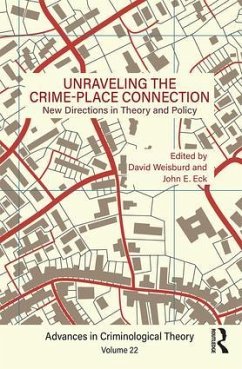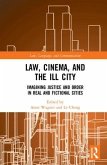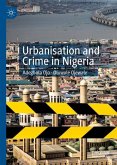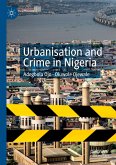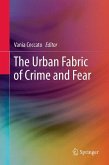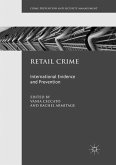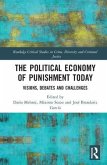Unraveling the Crime-Place Connection, Volume 22
New Directions in Theory and Policy
Herausgeber: Weisburd, David; Eck, John E
Unraveling the Crime-Place Connection, Volume 22
New Directions in Theory and Policy
Herausgeber: Weisburd, David; Eck, John E
- Gebundenes Buch
- Merkliste
- Auf die Merkliste
- Bewerten Bewerten
- Teilen
- Produkt teilen
- Produkterinnerung
- Produkterinnerung
Unraveling the Crime-Place Connection examines how places enhance our understanding of crime and its control in a new light. Theory has played a secondary role in the "criminology of place," and this volume brings it to the forefront of scholarly concerns. This volume will be of interest to criminologists worldwide, and has potential for some adoptions in graduate-level or advanced undergraduate courses on environmental criminology or crime prevention.
Andere Kunden interessierten sich auch für
![Law, Cinema, and the Ill City Law, Cinema, and the Ill City]() Law, Cinema, and the Ill City159,99 €
Law, Cinema, and the Ill City159,99 €![Urbanisation and Crime in Nigeria Urbanisation and Crime in Nigeria]() Adegbola OjoUrbanisation and Crime in Nigeria74,99 €
Adegbola OjoUrbanisation and Crime in Nigeria74,99 €![Urbanisation and Crime in Nigeria Urbanisation and Crime in Nigeria]() Adegbola OjoUrbanisation and Crime in Nigeria74,99 €
Adegbola OjoUrbanisation and Crime in Nigeria74,99 €![The Urban Fabric of Crime and Fear The Urban Fabric of Crime and Fear]() The Urban Fabric of Crime and Fear110,99 €
The Urban Fabric of Crime and Fear110,99 €![Retail Crime Retail Crime]() Retail Crime60,99 €
Retail Crime60,99 €![The Political Economy of Punishment Today The Political Economy of Punishment Today]() The Political Economy of Punishment Today191,99 €
The Political Economy of Punishment Today191,99 €![Heritage, Memory, and Punishment Heritage, Memory, and Punishment]() Shu-Mei HuangHeritage, Memory, and Punishment191,99 €
Shu-Mei HuangHeritage, Memory, and Punishment191,99 €-
-
-
Unraveling the Crime-Place Connection examines how places enhance our understanding of crime and its control in a new light. Theory has played a secondary role in the "criminology of place," and this volume brings it to the forefront of scholarly concerns. This volume will be of interest to criminologists worldwide, and has potential for some adoptions in graduate-level or advanced undergraduate courses on environmental criminology or crime prevention.
Produktdetails
- Produktdetails
- Verlag: Taylor & Francis Ltd (Sales)
- Seitenzahl: 308
- Erscheinungstermin: 20. November 2017
- Englisch
- Abmessung: 229mm x 152mm x 19mm
- Gewicht: 581g
- ISBN-13: 9781138552395
- ISBN-10: 1138552399
- Artikelnr.: 57055317
- Verlag: Taylor & Francis Ltd (Sales)
- Seitenzahl: 308
- Erscheinungstermin: 20. November 2017
- Englisch
- Abmessung: 229mm x 152mm x 19mm
- Gewicht: 581g
- ISBN-13: 9781138552395
- ISBN-10: 1138552399
- Artikelnr.: 57055317
David Weisburd is Distinguished Professor of Criminology, Law and Society at George Mason University and Walter E. Meyer Professor of Law and Criminal Justice at the Hebrew University of Jerusalem. He is also Executive Director of the Center for Evidence Based Crime Policy. Professor Weisburd is an elected Fellow of the American Society of Criminology and of the Academy of Experimental Criminology. He is a member of the Science Advisory Board of the Office of Justice Programs (USA), the Steering Committee of the Campbell Crime and Justice Group, and the Scientific Commission of the International Society of Criminology. He is also a National Associate of the National Academy of Sciences (USA) and Chair of its Committee on Proactive Policing. Professor Weisburd is author or editor of more than 25 books and more than 175 scientific articles that cover a wide range of criminal justice research topics. Professor Weisburd was the Founding Editor of the Journal of Experimental Criminology and is now the General Editor of the Journal of Quantitative Criminology. He has received many international prizes for his groundbreaking research on crime hot spots and policing, including the Stockholm Prize in Criminology (2010), the Klachky Family Prize for Advances on the Frontiers of Science (2011), the Robert Boruch Award for Contributions to Research that Informs Public Policy (2014), and the Sutherland Award from the ASC for "outstanding contributions to the field of criminology" (2014). In 2015 he received the Israel Prize, generally regarded as the State of Israel's highest honor. He received the Vollmer Award from the American Society of Criminology for his contributions to the science of crime prevention in 2017. John E. Eck is a professor at the School of Criminal Justice of the University of Cincinnati. His research has focused on police effectiveness and crime prevention, and the theories that can guide effective police and public actions to reduce crime. Central to Dr. Eck's enquiries are how crime patterns evolve and the role of owners in facilitating prevention at their places. He has been a leader in the use of computer simulation to understand how multiple agent interactions give rise to enduring hot spots of crime. He developed the concepts of place manager and place management to explain why a few locations have far more crime than others. Dr. Eck has conducted systematic reviews of what works to control crime at places. He is the coeditor of two books, Crime and Place (with David Weisburd), and Artificial Crime Analysis Systems: Using Computer Simulation and Geographic Information Systems (with Lin Liu).
Theoretical Foundations and Frontiers for Understanding High Crime Places:
An Introduction. Part I. Crime Concentration and the Dynamic Nature of
Places. Chapter 1: The Concentration-Dynamics Tradeoff in Crime Hot
Spotting. Chapter 2: Chronic and Temporary Crime Spots. Part II. Frameworks
for Understanding Crime and Place. Chapter 3: The Added Value of the
Criminology of Place to the Research Agenda of Environmental Criminology:
The Necessity of Mechanism-Based Frameworks. Chapter 4: The Relationship
Between Social Disorganization and Crime at the Micro Geographic Level:
Findings from Tel Aviv-Yafo Using Israeli Census Data. Chapter 5: Place and
Neighborhood Contexts. Part III. Managing Places and the Control of Crime.
Chapter 6: Place Manager Motivations and Crime Prevention. Chapter 7: The
Opportunity Structure for Bad Place Management: A Theory to Assist
Effective Regulation of High Crime Places. Part IV. The Role of Place-Based
Theory in Criminal Justice. Chapter 8: The Role of Place in Probation and
Parole. Chapter 9: A Micro Place Perspective for Theory and Research on
Police Behavior. Chapter 10: Not Just What Works, But How It Works:
Mechanisms and Context in the Effectiveness of Place-Based Policing.
Chapter 11. Beyond Putting "Cops on Dots": Applying Theory to Advance
Police Responses to Crime Places. Contributors. Index.
An Introduction. Part I. Crime Concentration and the Dynamic Nature of
Places. Chapter 1: The Concentration-Dynamics Tradeoff in Crime Hot
Spotting. Chapter 2: Chronic and Temporary Crime Spots. Part II. Frameworks
for Understanding Crime and Place. Chapter 3: The Added Value of the
Criminology of Place to the Research Agenda of Environmental Criminology:
The Necessity of Mechanism-Based Frameworks. Chapter 4: The Relationship
Between Social Disorganization and Crime at the Micro Geographic Level:
Findings from Tel Aviv-Yafo Using Israeli Census Data. Chapter 5: Place and
Neighborhood Contexts. Part III. Managing Places and the Control of Crime.
Chapter 6: Place Manager Motivations and Crime Prevention. Chapter 7: The
Opportunity Structure for Bad Place Management: A Theory to Assist
Effective Regulation of High Crime Places. Part IV. The Role of Place-Based
Theory in Criminal Justice. Chapter 8: The Role of Place in Probation and
Parole. Chapter 9: A Micro Place Perspective for Theory and Research on
Police Behavior. Chapter 10: Not Just What Works, But How It Works:
Mechanisms and Context in the Effectiveness of Place-Based Policing.
Chapter 11. Beyond Putting "Cops on Dots": Applying Theory to Advance
Police Responses to Crime Places. Contributors. Index.
Theoretical Foundations and Frontiers for Understanding High Crime Places:
An Introduction. Part I. Crime Concentration and the Dynamic Nature of
Places. Chapter 1: The Concentration-Dynamics Tradeoff in Crime Hot
Spotting. Chapter 2: Chronic and Temporary Crime Spots. Part II. Frameworks
for Understanding Crime and Place. Chapter 3: The Added Value of the
Criminology of Place to the Research Agenda of Environmental Criminology:
The Necessity of Mechanism-Based Frameworks. Chapter 4: The Relationship
Between Social Disorganization and Crime at the Micro Geographic Level:
Findings from Tel Aviv-Yafo Using Israeli Census Data. Chapter 5: Place and
Neighborhood Contexts. Part III. Managing Places and the Control of Crime.
Chapter 6: Place Manager Motivations and Crime Prevention. Chapter 7: The
Opportunity Structure for Bad Place Management: A Theory to Assist
Effective Regulation of High Crime Places. Part IV. The Role of Place-Based
Theory in Criminal Justice. Chapter 8: The Role of Place in Probation and
Parole. Chapter 9: A Micro Place Perspective for Theory and Research on
Police Behavior. Chapter 10: Not Just What Works, But How It Works:
Mechanisms and Context in the Effectiveness of Place-Based Policing.
Chapter 11. Beyond Putting "Cops on Dots": Applying Theory to Advance
Police Responses to Crime Places. Contributors. Index.
An Introduction. Part I. Crime Concentration and the Dynamic Nature of
Places. Chapter 1: The Concentration-Dynamics Tradeoff in Crime Hot
Spotting. Chapter 2: Chronic and Temporary Crime Spots. Part II. Frameworks
for Understanding Crime and Place. Chapter 3: The Added Value of the
Criminology of Place to the Research Agenda of Environmental Criminology:
The Necessity of Mechanism-Based Frameworks. Chapter 4: The Relationship
Between Social Disorganization and Crime at the Micro Geographic Level:
Findings from Tel Aviv-Yafo Using Israeli Census Data. Chapter 5: Place and
Neighborhood Contexts. Part III. Managing Places and the Control of Crime.
Chapter 6: Place Manager Motivations and Crime Prevention. Chapter 7: The
Opportunity Structure for Bad Place Management: A Theory to Assist
Effective Regulation of High Crime Places. Part IV. The Role of Place-Based
Theory in Criminal Justice. Chapter 8: The Role of Place in Probation and
Parole. Chapter 9: A Micro Place Perspective for Theory and Research on
Police Behavior. Chapter 10: Not Just What Works, But How It Works:
Mechanisms and Context in the Effectiveness of Place-Based Policing.
Chapter 11. Beyond Putting "Cops on Dots": Applying Theory to Advance
Police Responses to Crime Places. Contributors. Index.

